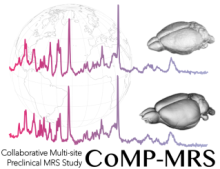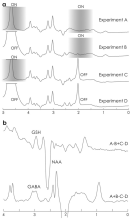
The Collaborative Multi-Site Preclinical MRS Study (CoMP-MRS) is an international initiative uniting the rodent MRS community to perform the first large-scale, multi-site evaluation of MRS methodologies in rats and mice. Data from participating centers will be used to assess methodological variability and inform evidence-based best practices for preclinical MRS.
All datasets and automated pipelines will be available in a public, open-source repository. Ultimately, CoMP-MRS aims to identify the factors influencing spectral quality and neurochemical quantification, laying the groundwork for standardization and reproducibility in preclinical rodent MRS.

Magnetic resonance spectroscopy (MRS) studies can generate extensive and complex datasets, especially when multiple modalities are employed. The organization of such data usually differs between (or even within) labs. This makes the sharing or reusing of data difficult, impeding transparency and reproducibility. To address this, the neuroimaging community created the Brain Imaging Data Structure (BIDS) specification. Inspired by the practices of the OpenNeuro repository, BIDS has served as a standard for the organization of neuroimaging data and metadata, but its principles have also been applied to other biomedical imaging and non-imaging modalities. BIDS currently covers many brain imaging methods, such as MRI techniques (e.g., fMRI, diffusion imaging, arterial spin labeling), magnetoencephalography, electroencephalography, and positron emission tomography. Together with other ongoing efforts to include other modalities, we are developing an extension to BIDS for MRS data, termed MRS-BIDS.
Relevant publications
Bouchard AE, Wong D, Bogner W, Gau R, Halchenko YO, Lamb DG, Markiewicz CJ, Mullins PG, Niso G, Oeltzschner G, Appelhoff S, Blair R, Earl E, Galassi A, Hardcastle N, Pfarr JK, Ray K, Rogers C, Salo T, Clarke WT, Wilson M, Mikkelsen M. MRS-BIDS, an extension to the Brain Imaging Data Structure for magnetic resonance spectroscopy. Sci Data. 2025;12(1):1384. doi:10.1038/s41597-025-05543-2

Edited magnetic resonance spectroscopy can measure low-concentration chemicals in the human brain noninvasively, usually one chemical at a time. In this project, new technologies and software will be developed to measure multiple low-concentration chemicals simultaneously in a single scan. These developments will allow scientists and clinicians to study biochemicals important to human health more efficiently and reliably.

Gannet is a free, open-source MATLAB-based software toolkit for analyzing edited single-voxel 1H magnetic resonance spectroscopy (MRS) data. Its largely automated functions cover all the essential steps of modern MRS analysis:
- Loading raw data
- Substantial preprocessing
- Signal modeling
- Voxel co-registration with structural MR images
- Concentration estimation based on tissue composition
Several existing software packages for MRS data analysis require substantial user input or offer a wide selection of processing options. In contrast, the philosophy behind Gannet is to provide users with a complete automated pipeline without the need for significant user input.
Additionally, as open-source software, advanced users have the ability to modify the underlying routines for ad hoc purposes.
Further details can found on the Gannet documentation website.

